Unit 10 I'd like some noodles 单元复习课件 (共30张PPT)
文档属性
| 名称 | Unit 10 I'd like some noodles 单元复习课件 (共30张PPT) | 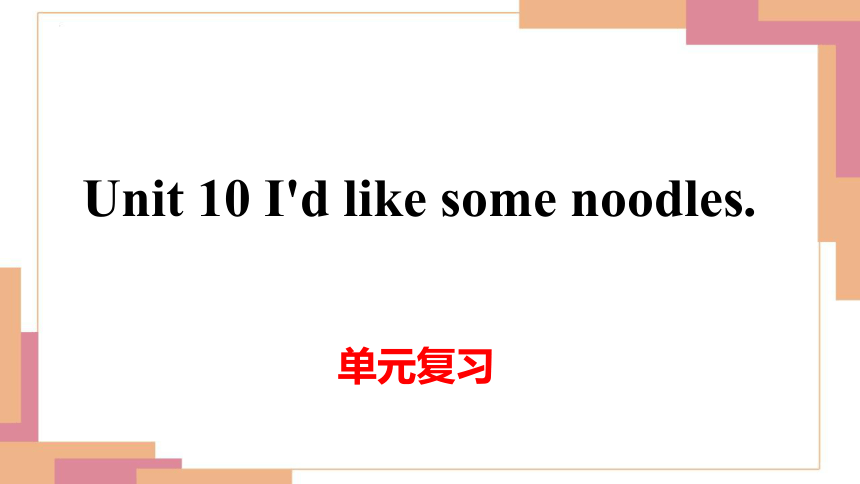 | |
| 格式 | pptx | ||
| 文件大小 | 4.0MB | ||
| 资源类型 | 教案 | ||
| 版本资源 | 人教新目标(Go for it)版 | ||
| 科目 | 英语 | ||
| 更新时间 | 2023-06-21 09:34:43 | ||
图片预览


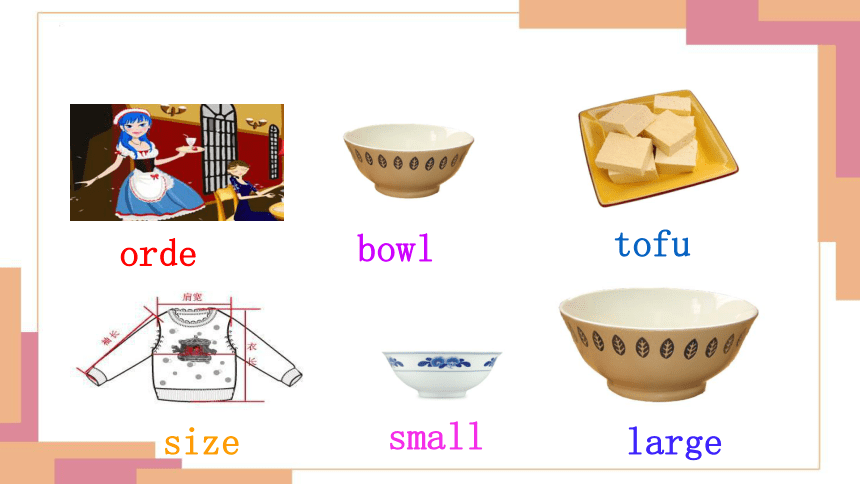
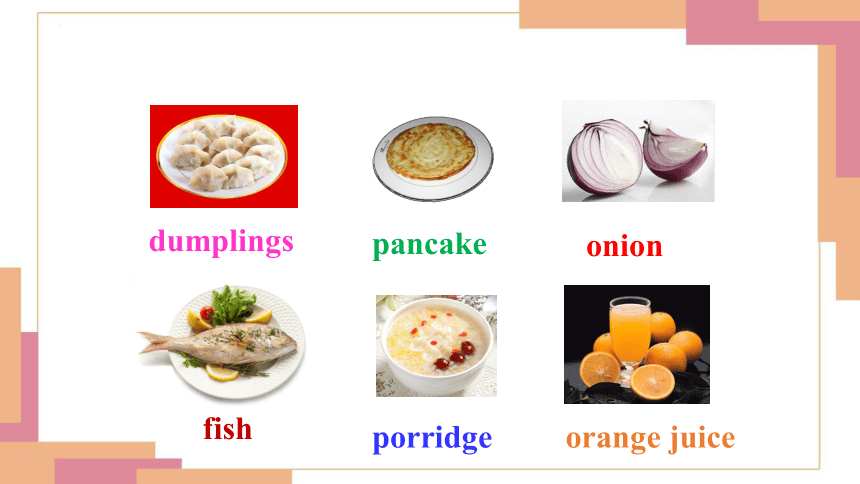
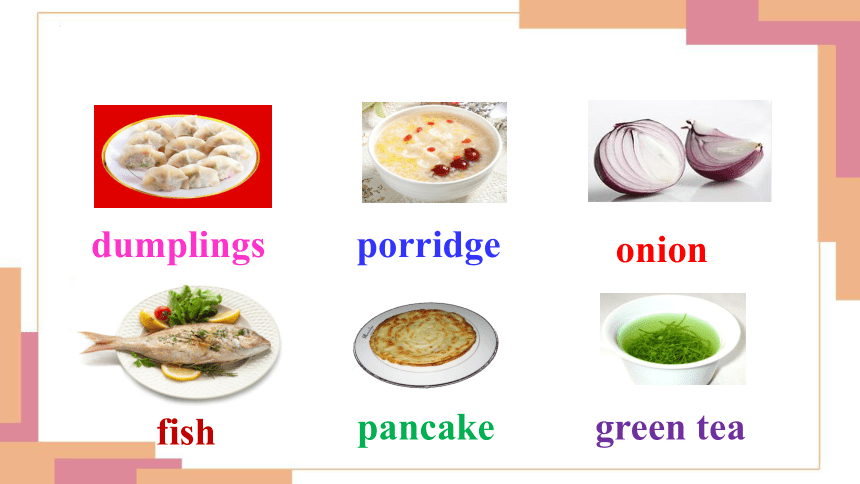
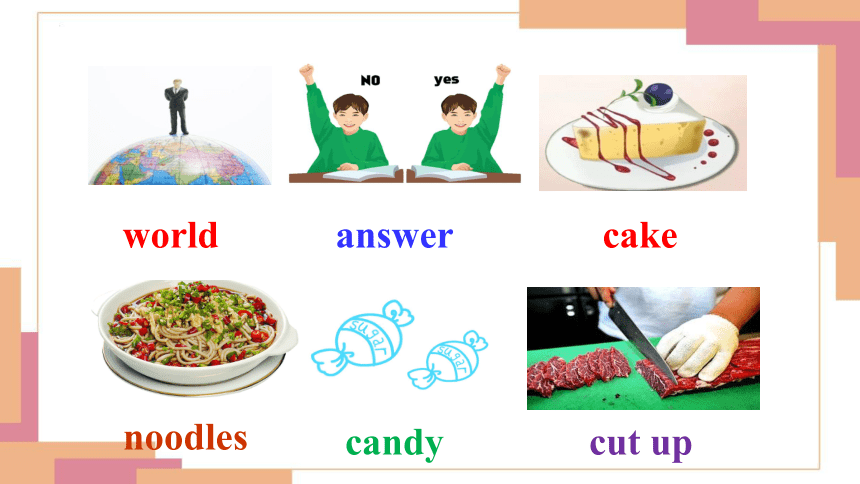
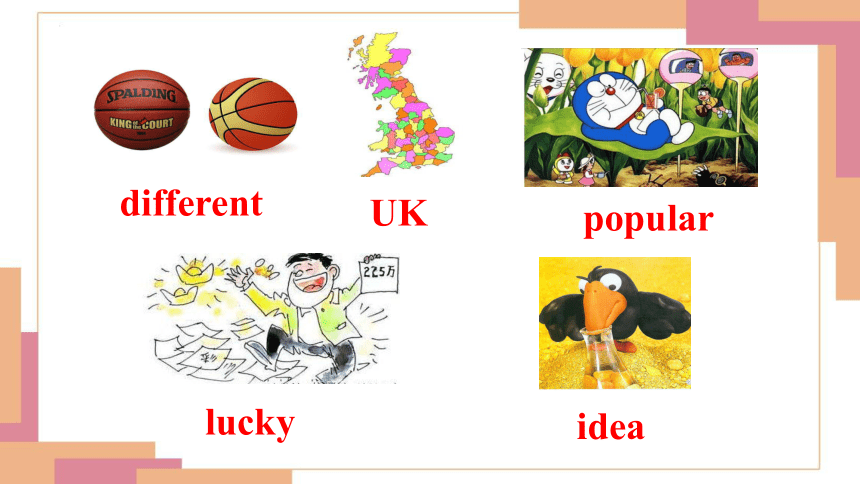
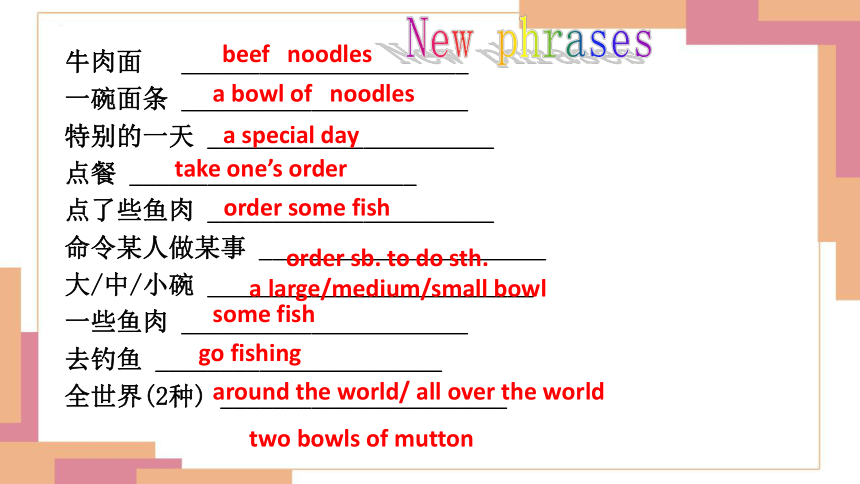
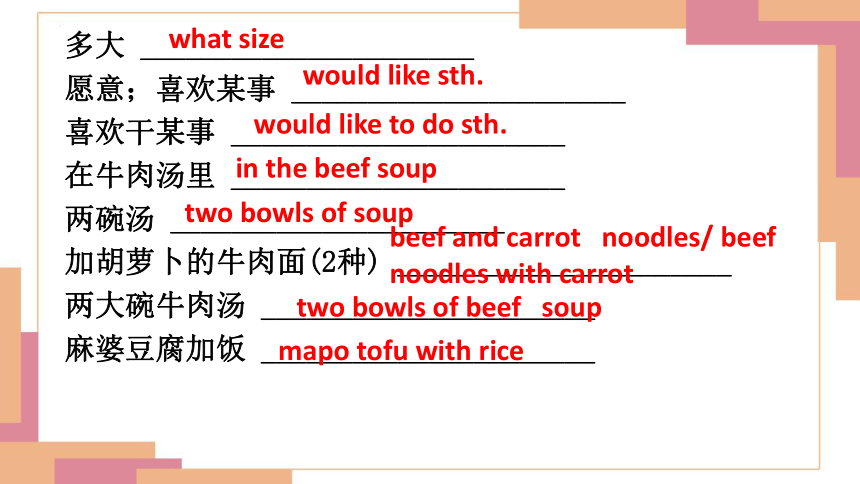
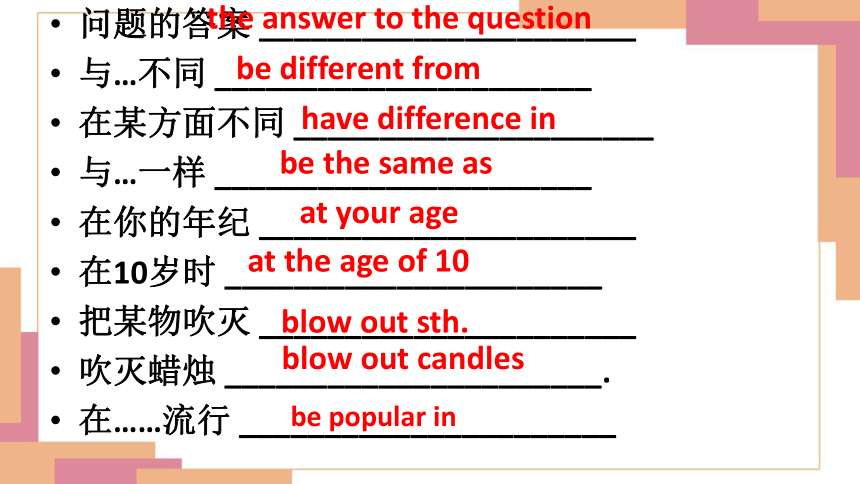
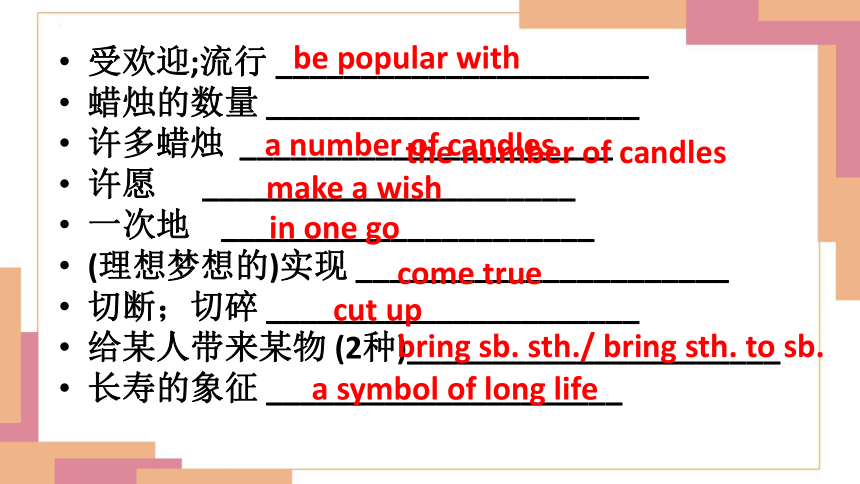
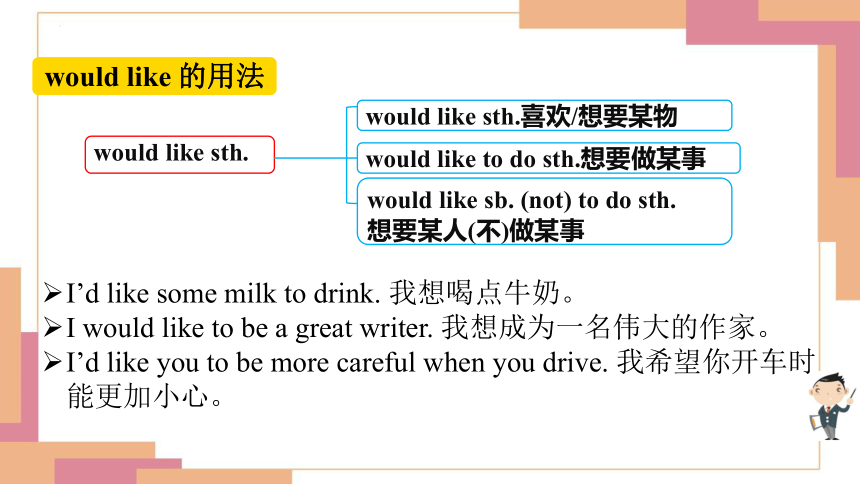
文档简介
(共30张PPT)
单元复习
Unit 10 I'd like some noodles.
noodles
beef
['nu:dlz]
[bi:f]
Words and expressions
mutton
[ m tn]
potatoes
special
[p te t ]
[ spe l]
bowl
tofu
order
size
large
small
onion
pancake
porridge
dumplings
fish
orange juice
onion
pancake
porridge
dumplings
green tea
fish
cake
candy
answer
world
cut up
noodles
different
UK
lucky
idea
popular
牛肉面 ______________________
一碗面条 ______________________
特别的一天 ______________________
点餐 ______________________
点了些鱼肉 ______________________
命令某人做某事 ______________________
大/中/小碗 _________________________
一些鱼肉 ______________________
去钓鱼 ______________________
全世界(2种) ______________________
beef noodles
a bowl of noodles
a special day
take one’s order
order some fish
order sb. to do sth.
a large/medium/small bowl
two bowls of mutton
go fishing
around the world/ all over the world
some fish
New phrases
多大 ______________________
愿意;喜欢某事 ______________________
喜欢干某事 ______________________
在牛肉汤里 ______________________
两碗汤 ______________________
加胡萝卜的牛肉面(2种) ______________________
两大碗牛肉汤 ______________________
麻婆豆腐加饭 ______________________
what size
would like sth.
would like to do sth.
in the beef soup
two bowls of soup
beef and carrot noodles/ beef noodles with carrot
two bowls of beef soup
mapo tofu with rice
问题的答案 ______________________
与…不同 ______________________
在某方面不同 _____________________
与…一样 ______________________
在你的年纪 ______________________
在10岁时 ______________________
把某物吹灭 ______________________
吹灭蜡烛 ______________________.
在……流行 ______________________
the answer to the question
be different from
have difference in
be the same as
at your age
at the age of 10
blow out sth.
blow out candles
be popular in
受欢迎;流行 ______________________
蜡烛的数量 ______________________
许多蜡烛 ______________________
许愿 ______________________
一次地 ______________________
(理想梦想的)实现 ______________________
切断;切碎 ______________________
给某人带来某物 (2种)______________________
长寿的象征 _____________________
be popular with
the number of candles
a number of candles
make a wish
in one go
come true
cut up
bring sb. sth./ bring sth. to sb.
a symbol of long life
would like 的用法
would like sth.
would like sth.喜欢/想要某物
would like to do sth.想要做某事
would like sb. (not) to do sth.
想要某人(不)做某事
I’d like some milk to drink. 我想喝点牛奶。
I would like to be a great writer. 我想成为一名伟大的作家。
I’d like you to be more careful when you drive. 我希望你开车时能更加小心。
—Would you like sth. —Yes, please. (肯定回答) —No, thanks. (否定回答) —Would you like to do sth.
—Sure, I’d love/like to. (肯定回答)
—Sorry, I’m afraid I can’t./I’d love/like to, but... (否定回答)
特殊疑问词(组) + would you like 特殊疑问词(组) + would you like to...
would like 的常用句型
可数名词与不可数名词用法对比
可数名词 不可数名词
有单数和复数之分。如:a box, two boxes。 没有复数形式。如:beef, mutton, meat, milk。
(1) 其前可直接用不定冠词a/an或具体的数词修饰,表示数量。如:a bowl ,an orange, two potatoes。 (2) 可用定冠词the修饰,表示特指,如:the girl(这个女孩)。 (1) 其前不能用不定冠词a/an或数词修饰。
(2) 可用定冠词the修饰,表示特指,如:the bread(这块面包)。
可用some, any, few, a few, many, lots of, a lot of等修饰。 可用some, any, little, a little, much, a lot of, lots of等修饰。
询问数量多少用how many。 询问量的多少用how much。
不可数名词量的表达
不可数名词的量可以用 “a/an/基数词+表示量的名词 + of + 不可数名词” 表示,这些表示量的名词有单复数形式的变化。这一结构作主语时,谓语动词的单复数形式要与表示量的名词保持一致。
There is a bottle of juice on the table. 桌子上有一瓶果汁。(谓语动词is与a bottle保持一致)
There are three bowls of mutton soup on the table. 桌子上有三碗羊肉汤。(谓语动词are与three bowls保持一致)
Language points
would like
1. What would you like 您需要什么?
would like和want表示“要;想要”,但两者语气上差别较大。前者礼貌委婉、正式规范,后者直接、非正式且随意。
I’d like a cup of black tea with milk, please.
请给我来杯加奶的红茶。
I want some hot tea, Mom. 妈妈,我想喝些热茶。
What do you want to eat today, children
孩子们,今天你们想吃些什么?
What would you like to order, sir 先生,您想点些什么?
2. I'd like beef noodles. 我想要牛肉面。
【用法详解】
beef noodles 中beef 作定语修饰名词noodles.
注意:名词作定语修饰名词时,作定语的名词一般只能用单数形式。
e.g. I want to make some word cards.
I'd like some egg noodles.
order n.& v. 点菜;命令
3. May I take your order 请问您可以点菜了吗?
【用法详解】
(1) order 在句中作名词,意为“点菜”。 take one’s order 表示“点菜”。
We can take our orders on the phone. 我们可以通过电话订餐。
(2) order 作名词,还可意为“命令;指示”。give orders 意为
“下命令”;take orders 意为“听从命令”。
She takes orders only from her father. 她只听从她父亲的吩咐。
【用法详解】 “What size… ”用于询问型号大小或尺码。其中size是名词,意为“大小;尺码”,既可指物体、面积或规模的大小,也可指鞋、衣服等的尺寸、尺码。
4. What size would you like 你们想要多大碗的?
询问型号、尺码的句型
衣服的尺码通常有L、M、S三种。 L代表large(大号的);M代表medium(中号的);S代表small(小号的)。
—What size does he wear 他穿多大尺码的?
—Size M. M码的。
I take size 8 in shoes. 我穿8码鞋。
5. One large bowl of beef soup…一份大碗牛肉汤……
large adj. 大号的;大的
large 意为“大号的;大的”,多指客观上规模、体积、容量或数目大。 Can you see the large building 你能看到那个大型建筑物吗?
big 意为“大的”,既可指客观上规模或体积大,也可指身材高大或地位重要。 There is a big tree in front of my house. 我家房前有一棵大树。
I have a big plan for the weekend. 我周末有一个重大计划。
【易混辨析】large与big
some和any 既可以修饰可数名词又可以修饰不可数名词, some常用在肯定句中,而any则常用在否定和疑问句中。所以, some 和 any 的区别: some和any 的用法主要
是考虑用在肯定句、疑问句还是否定句中,与名词的可数与否无关。
6. some和any的用法
some的用法: some意为“一些”,可作形
容词和代词。它常修饰可数名词复数。
e.g. some books 一些书
some boys 一些男孩
也可修饰不可数名词:
some water 一些水 some tea 一些茶叶
some 常用在肯定句中。
any的用法: any意为“任何一些”,它也可修饰可数名词复数或不可数名词,常用于疑问句和否定句。
e.g. I can’t see any tea. 我没看见茶叶。
Do you have any friends at school
你在学校有一些朋友吗
但在表示建议,反问,请求的疑问句中,或期望得到肯定回答时,多用some而不用any。
e.g. Would you like some coffee
你要不要来点咖啡?
How about some fruit juice
来点水果汁如何?
7. The number of candles is the person’s age. 蜡烛的数量是过生日的人的年龄。
the number of … …… 的数量
the number of 意为“……的数量” 作主语时,谓语动词要用单数形式。
a number of 意为“一些 ……;若干 ……” 作主语时,谓语动词要用复数形式。可用large, small等形容词来修饰number。
The number of students in our school is 300. A number of students have lunch in the dining hall. 我们学校有300名学生,有一些学生在食堂吃午饭。
1.She w_______ like to spend the holiday with her parents.
2.Please give me a large b_______ of noodles.
3.Here is the menu(菜单). You can o_______ your food.
4.There are some _______ (土豆).
5.I’d like beef _______ (面条).
6.There is a _______ (大的) dining hall in our school.
一、根据汉语或首字母提示填单词。
ould
owl
rder
noodles
potatoes
large
Exercises
1.This young man only needs twenty __________ (饺子).
2.Do you like eating __________ (粥) in the morning
3.There are so many __________ (洋葱) in the basket.
4.Do you like eating __________ (鱼肉)
5.How many __________ (饼) would you like
dumplings
porridge
onions
fish
二、根据汉语提示写出单词。
pancakes
1.I’d like noodles with _________ (potato) and beef.
2.There _________ (be) some chicken in the bowl.
3.We have different _________ (kind) of specials.
4.I’d like chicken and _________ (cabbage) noodles.
5.There are many _________ (carrot) in the soup.
三、用所给单词的正确形式填空。
potatoes
is
kinds
carrots
cabbage
四、单项选择。
1.— We have large bowls and small bowls. What _____ would you like
— A large bowl.
A. kind B. size C. color D. fruit
2.— ______________
— Yes, I’d like some dumplings and a glass of juice.
A. What do you like B. May I take your order
C. How is it going D. When do you want to eat
B
B
3.There is some ______ on the table.
A. potato B. egg C. tomato D. beef
D
4.—Would you like ______ shopping with me
—Yes, I’d love to.
A. go B. to go C. going D. goes
B
5.The workers would like many ______ for supper, because they keep carrying things all the afternoon.
A. bowl of noodle B. bowls of noodles
C. bowl of noodles D. bowls of noodle
B
1.I’d like a medium bowl. (改为一般疑问句)
________ you ______ a medium bowl
2.They’d like noodles with beef in them. (对画线部分提问)
________ ________ ________ noodles ________ they like
3.I want to buy a new coat. (改为同义句)
I ________ ________ _____ _____a new coat.
4.There are some books in my bag. (改为一般疑问句并作否定回答)
—_____ ______ _____books in your bag
—No, _____ ______ _____.
五、按要求完成句子(每空一词)。
Would like
What kind of would
would like to buy
Are there any
there aren’t any
单元复习
Unit 10 I'd like some noodles.
noodles
beef
['nu:dlz]
[bi:f]
Words and expressions
mutton
[ m tn]
potatoes
special
[p te t ]
[ spe l]
bowl
tofu
order
size
large
small
onion
pancake
porridge
dumplings
fish
orange juice
onion
pancake
porridge
dumplings
green tea
fish
cake
candy
answer
world
cut up
noodles
different
UK
lucky
idea
popular
牛肉面 ______________________
一碗面条 ______________________
特别的一天 ______________________
点餐 ______________________
点了些鱼肉 ______________________
命令某人做某事 ______________________
大/中/小碗 _________________________
一些鱼肉 ______________________
去钓鱼 ______________________
全世界(2种) ______________________
beef noodles
a bowl of noodles
a special day
take one’s order
order some fish
order sb. to do sth.
a large/medium/small bowl
two bowls of mutton
go fishing
around the world/ all over the world
some fish
New phrases
多大 ______________________
愿意;喜欢某事 ______________________
喜欢干某事 ______________________
在牛肉汤里 ______________________
两碗汤 ______________________
加胡萝卜的牛肉面(2种) ______________________
两大碗牛肉汤 ______________________
麻婆豆腐加饭 ______________________
what size
would like sth.
would like to do sth.
in the beef soup
two bowls of soup
beef and carrot noodles/ beef noodles with carrot
two bowls of beef soup
mapo tofu with rice
问题的答案 ______________________
与…不同 ______________________
在某方面不同 _____________________
与…一样 ______________________
在你的年纪 ______________________
在10岁时 ______________________
把某物吹灭 ______________________
吹灭蜡烛 ______________________.
在……流行 ______________________
the answer to the question
be different from
have difference in
be the same as
at your age
at the age of 10
blow out sth.
blow out candles
be popular in
受欢迎;流行 ______________________
蜡烛的数量 ______________________
许多蜡烛 ______________________
许愿 ______________________
一次地 ______________________
(理想梦想的)实现 ______________________
切断;切碎 ______________________
给某人带来某物 (2种)______________________
长寿的象征 _____________________
be popular with
the number of candles
a number of candles
make a wish
in one go
come true
cut up
bring sb. sth./ bring sth. to sb.
a symbol of long life
would like 的用法
would like sth.
would like sth.喜欢/想要某物
would like to do sth.想要做某事
would like sb. (not) to do sth.
想要某人(不)做某事
I’d like some milk to drink. 我想喝点牛奶。
I would like to be a great writer. 我想成为一名伟大的作家。
I’d like you to be more careful when you drive. 我希望你开车时能更加小心。
—Would you like sth. —Yes, please. (肯定回答) —No, thanks. (否定回答) —Would you like to do sth.
—Sure, I’d love/like to. (肯定回答)
—Sorry, I’m afraid I can’t./I’d love/like to, but... (否定回答)
特殊疑问词(组) + would you like 特殊疑问词(组) + would you like to...
would like 的常用句型
可数名词与不可数名词用法对比
可数名词 不可数名词
有单数和复数之分。如:a box, two boxes。 没有复数形式。如:beef, mutton, meat, milk。
(1) 其前可直接用不定冠词a/an或具体的数词修饰,表示数量。如:a bowl ,an orange, two potatoes。 (2) 可用定冠词the修饰,表示特指,如:the girl(这个女孩)。 (1) 其前不能用不定冠词a/an或数词修饰。
(2) 可用定冠词the修饰,表示特指,如:the bread(这块面包)。
可用some, any, few, a few, many, lots of, a lot of等修饰。 可用some, any, little, a little, much, a lot of, lots of等修饰。
询问数量多少用how many。 询问量的多少用how much。
不可数名词量的表达
不可数名词的量可以用 “a/an/基数词+表示量的名词 + of + 不可数名词” 表示,这些表示量的名词有单复数形式的变化。这一结构作主语时,谓语动词的单复数形式要与表示量的名词保持一致。
There is a bottle of juice on the table. 桌子上有一瓶果汁。(谓语动词is与a bottle保持一致)
There are three bowls of mutton soup on the table. 桌子上有三碗羊肉汤。(谓语动词are与three bowls保持一致)
Language points
would like
1. What would you like 您需要什么?
would like和want表示“要;想要”,但两者语气上差别较大。前者礼貌委婉、正式规范,后者直接、非正式且随意。
I’d like a cup of black tea with milk, please.
请给我来杯加奶的红茶。
I want some hot tea, Mom. 妈妈,我想喝些热茶。
What do you want to eat today, children
孩子们,今天你们想吃些什么?
What would you like to order, sir 先生,您想点些什么?
2. I'd like beef noodles. 我想要牛肉面。
【用法详解】
beef noodles 中beef 作定语修饰名词noodles.
注意:名词作定语修饰名词时,作定语的名词一般只能用单数形式。
e.g. I want to make some word cards.
I'd like some egg noodles.
order n.& v. 点菜;命令
3. May I take your order 请问您可以点菜了吗?
【用法详解】
(1) order 在句中作名词,意为“点菜”。 take one’s order 表示“点菜”。
We can take our orders on the phone. 我们可以通过电话订餐。
(2) order 作名词,还可意为“命令;指示”。give orders 意为
“下命令”;take orders 意为“听从命令”。
She takes orders only from her father. 她只听从她父亲的吩咐。
【用法详解】 “What size… ”用于询问型号大小或尺码。其中size是名词,意为“大小;尺码”,既可指物体、面积或规模的大小,也可指鞋、衣服等的尺寸、尺码。
4. What size would you like 你们想要多大碗的?
询问型号、尺码的句型
衣服的尺码通常有L、M、S三种。 L代表large(大号的);M代表medium(中号的);S代表small(小号的)。
—What size does he wear 他穿多大尺码的?
—Size M. M码的。
I take size 8 in shoes. 我穿8码鞋。
5. One large bowl of beef soup…一份大碗牛肉汤……
large adj. 大号的;大的
large 意为“大号的;大的”,多指客观上规模、体积、容量或数目大。 Can you see the large building 你能看到那个大型建筑物吗?
big 意为“大的”,既可指客观上规模或体积大,也可指身材高大或地位重要。 There is a big tree in front of my house. 我家房前有一棵大树。
I have a big plan for the weekend. 我周末有一个重大计划。
【易混辨析】large与big
some和any 既可以修饰可数名词又可以修饰不可数名词, some常用在肯定句中,而any则常用在否定和疑问句中。所以, some 和 any 的区别: some和any 的用法主要
是考虑用在肯定句、疑问句还是否定句中,与名词的可数与否无关。
6. some和any的用法
some的用法: some意为“一些”,可作形
容词和代词。它常修饰可数名词复数。
e.g. some books 一些书
some boys 一些男孩
也可修饰不可数名词:
some water 一些水 some tea 一些茶叶
some 常用在肯定句中。
any的用法: any意为“任何一些”,它也可修饰可数名词复数或不可数名词,常用于疑问句和否定句。
e.g. I can’t see any tea. 我没看见茶叶。
Do you have any friends at school
你在学校有一些朋友吗
但在表示建议,反问,请求的疑问句中,或期望得到肯定回答时,多用some而不用any。
e.g. Would you like some coffee
你要不要来点咖啡?
How about some fruit juice
来点水果汁如何?
7. The number of candles is the person’s age. 蜡烛的数量是过生日的人的年龄。
the number of … …… 的数量
the number of 意为“……的数量” 作主语时,谓语动词要用单数形式。
a number of 意为“一些 ……;若干 ……” 作主语时,谓语动词要用复数形式。可用large, small等形容词来修饰number。
The number of students in our school is 300. A number of students have lunch in the dining hall. 我们学校有300名学生,有一些学生在食堂吃午饭。
1.She w_______ like to spend the holiday with her parents.
2.Please give me a large b_______ of noodles.
3.Here is the menu(菜单). You can o_______ your food.
4.There are some _______ (土豆).
5.I’d like beef _______ (面条).
6.There is a _______ (大的) dining hall in our school.
一、根据汉语或首字母提示填单词。
ould
owl
rder
noodles
potatoes
large
Exercises
1.This young man only needs twenty __________ (饺子).
2.Do you like eating __________ (粥) in the morning
3.There are so many __________ (洋葱) in the basket.
4.Do you like eating __________ (鱼肉)
5.How many __________ (饼) would you like
dumplings
porridge
onions
fish
二、根据汉语提示写出单词。
pancakes
1.I’d like noodles with _________ (potato) and beef.
2.There _________ (be) some chicken in the bowl.
3.We have different _________ (kind) of specials.
4.I’d like chicken and _________ (cabbage) noodles.
5.There are many _________ (carrot) in the soup.
三、用所给单词的正确形式填空。
potatoes
is
kinds
carrots
cabbage
四、单项选择。
1.— We have large bowls and small bowls. What _____ would you like
— A large bowl.
A. kind B. size C. color D. fruit
2.— ______________
— Yes, I’d like some dumplings and a glass of juice.
A. What do you like B. May I take your order
C. How is it going D. When do you want to eat
B
B
3.There is some ______ on the table.
A. potato B. egg C. tomato D. beef
D
4.—Would you like ______ shopping with me
—Yes, I’d love to.
A. go B. to go C. going D. goes
B
5.The workers would like many ______ for supper, because they keep carrying things all the afternoon.
A. bowl of noodle B. bowls of noodles
C. bowl of noodles D. bowls of noodle
B
1.I’d like a medium bowl. (改为一般疑问句)
________ you ______ a medium bowl
2.They’d like noodles with beef in them. (对画线部分提问)
________ ________ ________ noodles ________ they like
3.I want to buy a new coat. (改为同义句)
I ________ ________ _____ _____a new coat.
4.There are some books in my bag. (改为一般疑问句并作否定回答)
—_____ ______ _____books in your bag
—No, _____ ______ _____.
五、按要求完成句子(每空一词)。
Would like
What kind of would
would like to buy
Are there any
there aren’t any
同课章节目录
- Unit 1 Can you play the guitar?
- Section A
- Section B
- Unit 2 What time do you go to school?
- Section A
- Section B
- Unit 3 How do you get to school?
- Section A
- Section B
- Unit 4 Don't eat in class.
- Section A
- Section B
- Unit 5 Why do you like pandas?
- Section A
- Section B
- Unit 6 I'm watching TV.
- Section A
- Section B
- Review of Units 1-6
- Unit 7 It's raining!
- Section A
- Section B
- Unit 8 Is there a post office near here?
- Section A
- Section B
- Unit 9 What does he look like?
- Section A
- Section B
- Unit 10 I'd like some noodles.
- Section A
- Section B
- Unit 11 How was your school trip?
- Section A
- Section B
- Unit 12 What did you do last weekend?
- Section A
- Section B
